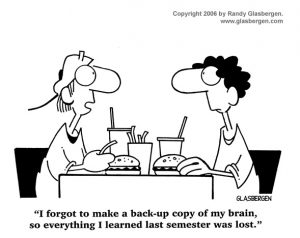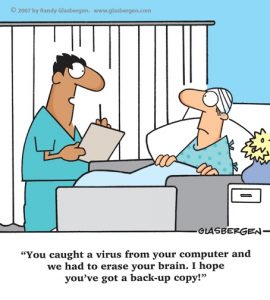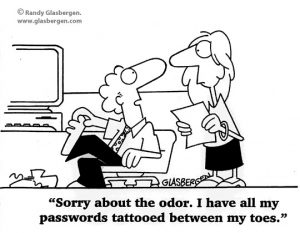The singularity is supposed to be when man will be able to transfer his consciousness into machines and achieve immortality. So he basically become s some freakish self-aware robot. I’m saying this without knowing fully that this will ever happen. (I heard about it from The Big Bang Theory – Season 4, Episode 2.)
s some freakish self-aware robot. I’m saying this without knowing fully that this will ever happen. (I heard about it from The Big Bang Theory – Season 4, Episode 2.)
LIMITED STORAGE SPACE
If you do my kind of work, you probably have to deal with tens, maybe hundreds of passwords. Now one of the biggest problems with IT geeks is the self-belief that our brains are supercomputers. Here is the fact: they are not! As such, thinking you can retain many passwords for your PC logins, social network accounts, email accounts, online banking accounts is just not plausible. Of course, that is unless you have an expansion slot for an SD memory card somewhere on the side of your head (in which case I doubt you’re human). As a systems administrator, I have to memorise lots of usernames and passwords and this proves to be an arduous task. But even if you’re not an IT guy, you have to memorise so many sets of login credentials, and I’ll bet you’ve forgotten this or that set of credentials on a number of occasions… so you obviously agree that the brain’s storage space is generally limited. In fact, a survey done by Centrify proves that remembering passwords has become a daunting everyday activity for most office workers in their Password Rage survey. Now also note that the Chief Geek (God) never provided an offline or offsite storage facility to back up the data in our brains. Moreover, the medical fraternity (and Sheldon, from The Big Bang Theory) have yet to figure out a way to hardwire our brains to network attached storage or a backup server. So then how do we remember critical information such as passwords? Simple: we don’t need to remember them at all.
you can retain many passwords for your PC logins, social network accounts, email accounts, online banking accounts is just not plausible. Of course, that is unless you have an expansion slot for an SD memory card somewhere on the side of your head (in which case I doubt you’re human). As a systems administrator, I have to memorise lots of usernames and passwords and this proves to be an arduous task. But even if you’re not an IT guy, you have to memorise so many sets of login credentials, and I’ll bet you’ve forgotten this or that set of credentials on a number of occasions… so you obviously agree that the brain’s storage space is generally limited. In fact, a survey done by Centrify proves that remembering passwords has become a daunting everyday activity for most office workers in their Password Rage survey. Now also note that the Chief Geek (God) never provided an offline or offsite storage facility to back up the data in our brains. Moreover, the medical fraternity (and Sheldon, from The Big Bang Theory) have yet to figure out a way to hardwire our brains to network attached storage or a backup server. So then how do we remember critical information such as passwords? Simple: we don’t need to remember them at all.
PASSWORD MANAGEMENT TOOLS
An easy way of keeping track of user logins is to use password management software. This came to me as an epiphany a couple of years ago, w hen one day I needed to restore Skype and Outlook passwords for accounts that I had created for nearly 15 users. There was no way of retrieving the data from my brain, because it had long since been deleted from there. And then it occurred to me that I could avoid that problem in future by using a password manager. So I went online in search of a good password manager.
hen one day I needed to restore Skype and Outlook passwords for accounts that I had created for nearly 15 users. There was no way of retrieving the data from my brain, because it had long since been deleted from there. And then it occurred to me that I could avoid that problem in future by using a password manager. So I went online in search of a good password manager.
DOC’S PICK
KeePass is a nifty little application that allows you to enter different types of login credentials: Windows, Internet (for email and other online logins), network devices, storage devices, personal banking, phones, and a host of others. This software also checks the strength of your passwords, allows you to duplicate entries and create more groups of credentials. (Oh, and there is an Android version as well, called KeePassDroid.)
All the data in the application is kept in a database which it creates. You can save the database anywhere on your PC, and it is good practice to back it up offline. Now I mentioned that you don’t have to remember any passwords at all. Well that’s not entirely true for KeePass, nor is it for other password managers. The software requires you to create a master password, which makes perfect sense because you don’t want anybody just opening your password manager and viewing all your passwords. It’s like the principle of keeping all the keys to the rooms in your house in one secure location (password manager) and keeping the key to the secure location (master password for the password manager) in another room (backed-up database).
IN CLOSING…
Yes, you’re super-smart and you remember the colour of the socks your great Uncle Ben wore at your high school graduation party, but no, you’re not going to remember all the software activation keys, and the passwords to your email accounts, and online banking and Amazon accounts, especially now that you have joined all the social networks that exist. And yes, you will eventually lose the piece of recycled paper you wrote all your passwords on, after the letter ‘E’ fades and starts looking like an ‘F’ or an ‘L’. Plus, Excel serves better purposes than keeping passwords. Also, no form of exhibitionism will permit you to tattoo your passwords between your toes or inside your eyelids. And no, you may NOT use the same password for all the accounts you have. So until the earliest appearance of The Singularity (which may never actually happen), do yourself a favour by opening a new tab in your browser (leave this tab open so you can finish the article), go to Google, and find yourself a good password manager. Or you could simply download KeePass from the owner’s Web site.
I hope this article has provided some insight on password management, and the need to install a USB port on the side of your head to back up all your critical data. For comments and contributions, use the Comments section below.